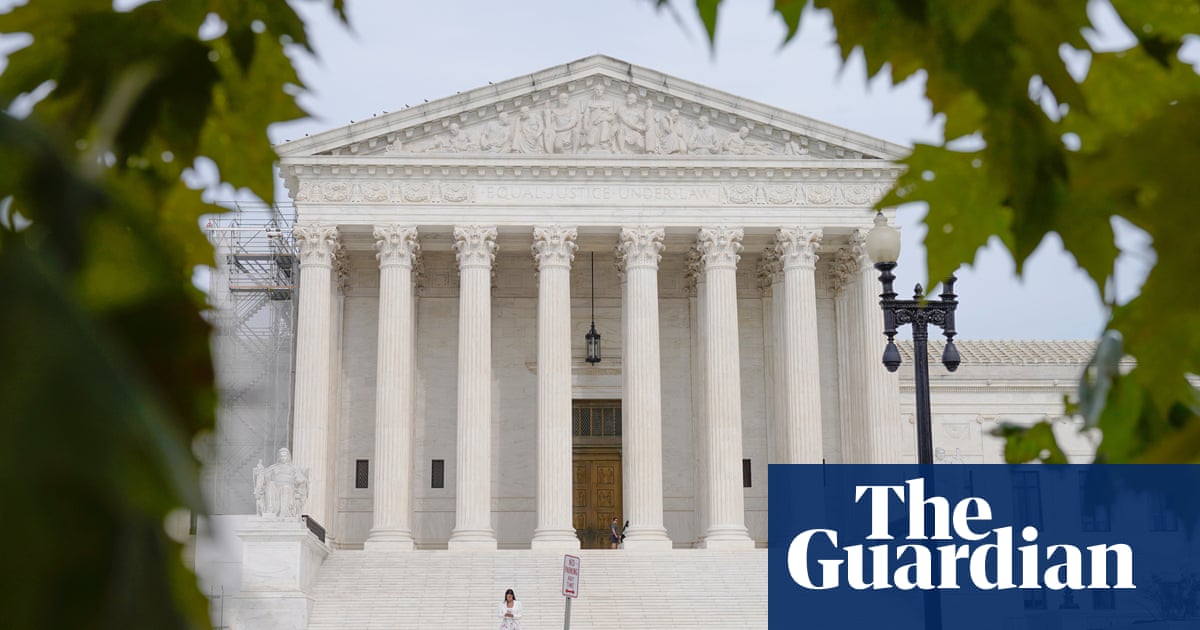Joe Biden worries that the “extreme” US supreme court, dominated by rightwing justices, cannot be relied upon to uphold the rule of law.
“I worry,” the president told ProPublica in interview published on Sunday. “Because I know that if the other team, the Maga Republicans, win, they don’t want to uphold the rule of law.”
“Maga” is shorthand for “Make America great again”, Donald Trump’s campaign slogan. Trump faces 91 criminal charges and assorted civil threats but nonetheless dominates Republican polling for the nomination to face Biden in a presidential rematch next year.
In four years in the White House, Trump nominated and saw installed three conservative justices, tilting the court 6-3 to the right. That court has delivered significant victories for conservatives, including the removal of the right to abortion and major rulings on gun control, affirmative action and other issues.
The new court term, which starts on Tuesday, could see further such rulings on matters including government environmental and financial regulation.



Our constitution has been updated. Our current constitution is from the 90s. It’s just we update it in pain in the ass bits and pieces
Of course, I am aware that the U.S. Constitution has been updated several times and that any changes are a difficult political process (this is the case in every democratic country). From a European point of view, it is just difficult to understand why, for example, majority voting has still not been introduced and so on. In our system, it is unthinkable that votes are effectively devalued because the majority in one state disagrees. I understand, of course, that that was necessary some 250 years ago, so that electors could be sent to Washington to represent the will of the people of their particular state. But is that still in keeping with the times? To me, it seems antiquated - as does the attempt to guarantee independent constitutional judges by appointing them for life and thus - in theory - making them independent of political influence. I think that reality has shown that this is nothing but wishful thinking. Otherwise, a supreme justice like Clarence Thomas, who is obviously not only bound by his conscience, would probably no longer be in office. I just think that self-regulation has never really been effective - not in politics, law, or business.
One single office is elected with the Electoral College.
And? What’s your point? We’ve had several presidents in the last, what 30-40 years, who lost the popular vote but got to be president anyway because we decided some states matter more than others.
The president? Isn’t that the most important office that comes with a lot of power?
Keep moving those goalposts.
The president is in charge of managing the country, but he is beholden to the legislative and judicial branches. The president can’t unilaterally do much.
How does the prime minister get elected in most countries? It’s typically because the population elects a representative body, and that body elects a PM. Most countries do not directly elect a PM.
How do laws get passed in most countries. You elect a legislative branch and that legislative branch votes on laws.
The vast majority of even the most democratic countries do not directly vote on much, because nobody wants that.
That’s true. But no votes are lost in the election of a prime minister. People usually elect a party and the parties with the most votes in turn elect the prime minister (via various detours depending on the country). The prime minister is thus elected through a majority system: The party with the most votes usually provides the prime minister. Gerrymandering or something like that is therefore not necessary. In the U.S., however, the president is not elected by majority (how many votes a candidate got in total), but by electoral college, which votes according to how the majority in a state voted. This results in your vote being devalued if it does not match the majority in the state you live in. Here’s the difference: if you voted for a party to represent you, your vote would be counted even if you were in the minority in your home state. Under an electoral college system, that’s not the case: your vote is irrelevant if you’re in the minority in your home state. I can’t make sense of this other than on historical grounds: I think it used to be that elections would be held in a state and then a representative of the state, an electoral college, would ride into Washington and vote in the presidential election as the majority in the state from which he came. That doesn’t seem contemporary to me.
It makes more sense if you look at the United States as a group of individual entities with a Federal level that helps coordinate between them. It’s more like the EU, and less like individual provinces.
Each state decides how to send its electors to vote for the president. Most of the states decided to send them as a winner take all batch of votes, but some decided to allow split votes.
It’s not a perfect system by far, but it makes sense in the context of what it is.
That was the context at the start of the country, it’s not really applicable anymore.
While most states work that way, Maine and Nebraska are not winner-take-all and have split their votes more proportionally.